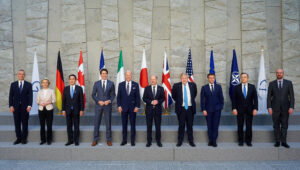Since the beginning of Russia’s invasion of Ukraine, G7 countries have had to embark on an accelerated diversification of energy supply sources. On the one hand, this has led to the temporary and emergency employment of traditional sources, such as coal, or the revival of long-standing ambitions, such as Italy’s role as a European gas hub. Both solutions, though, have negative implications for the efforts to tackle climate change. Besides, their economic, technical, and financial feasibility is doubtful. Being a gas hub would create new dependencies as well as uncertain and unsustainable relations with highly unstable countries in geographically complex areas.
On the other hand, the geopolitical upheaval has led to an acceleration of the transition from gas to a clean and more resilient system. In this regard, it is first be acknowledged that in Europe and especially in Italy natural gas is reaching the end of its role as a transition fuel. In Italy, this transition began in the 1990s, when the switch from coal to natural gas in the electricity system was initiated. Today, the two most important challenges for the country’s energy, economic, and climate security correspond to planning to phase-out natural gas in the electricity system and in the building sector – thus leaving more time for the industrial sector to innovate. The figures for the 2022-2023 winter are encouraging: the policies and the ability to save gas in all sectors have played a major role in securing the system and partly mitigating the impact of high gas prices. This even exceeded the estimations in the European policies or the impact of abnormal temperatures.
In this context, the G7 Ministers’ Meeting on Climate, Energy and Environment held in Sapporo on 15-16 April sent an important signal in the direction of overcoming the fossil-fuel model despite some reticence. Indeed, the G7 Presidency held by Japan, which is traditionally reluctant to move away from dependence on fossil fuels – both domestically and in the context of international cooperation with Asian partners – has focused on development models that are often not aligned with climate targets. The fact that the Japanese government is seeking clear and formal support from G7 countries for both its concept of ‘Green Transformation (GX)‘ – in order to maintain and prolong the use of fossil fuel technologies and infrastructure through the use of ammonia and hydrogen to co-fire coal in power generation – and its attempt to expand funding for liquefied natural gas (LNG), including investment in new gas production in Asia, openly contrasts with the transition pathway of limiting the global average temperature to within 1.5°C.
The scientific evidence gathered in the recently-published AR6 Synthesis Report of the IPCC underlines the scale and speed of the growing impacts of climate change and the action needed to ensure that the 1.5°C limit is not exceeded. The report includes clear calls for major emitters – including G7 members – to dramatically accelerate efforts to decarbonise their economies by adopting and scaling up existing solutions and significantly increasing their financial contributions to support developing countries. On the same wavelength is UN Secretary General Antonio Guterres’ call in response to the IPCC report, which put forward “an Acceleration Agenda for Global Climate Action” presented on 20 March. This aims to bring forward the deadline to achieve climate neutrality for developed countries to 2040 and that for developing countries to 2050. Furthermore, the agenda calls for a global reduction of fossil fuels by ceasing all licensing or financing of new oil and gas projects.
Therefore, the G7 Minister’s Meeting had to seek a delicate balance between the opposition from those governments defending the interests of the traditional fossil industry and the need to accelerate the transition. Despite the negative expectations, the Communiqué approved on 16 April relaunches the G7 countries’ attention and commitment to the climate question. In particular, the definition of gas as a transition fuel is abandoned, and it is recognised that renewables and energy efficiency allow to break free from dependence on Russian gas and manage the inflation caused by the high price and the overall volatility of fossil fuels, especially of gas, during the crisis. This awareness finally seems to become established at least at an international level.
The recognition of the role of energy efficiency as the ‘first fuel’ and pillar of decarbonisation appears to be a change of pace in ensuring energy security and economic accessibility for the world’s major economies. The willingness to reassert the central role of renewables as a means to increase our energy security, indicating clear collective targets to install 150 GW of offshore wind capacity and more than 1 TW of solar photovoltaic by 2030, seems to confirm a change of approach. Finally, the push for a global phase-out of unabated fossil fuels seems to show a real willingness to play a leading role in the energy transition.
In the same direction, investments in the gas sector should be limited, except in the case of potential shortages caused by the crisis – where it should still be ensured that climate targets are met and lock-in effects in supply infrastructure are not created. As we have shown in analyses regarding Italy, the existing infrastructure is sufficient to ensure the security of the energy system as early as next winter, provided that energy efficiency policies, such as the ‘Superbonus’, are reviewed and implemented and a 10 GW per year development of renewables is achieved.
But a sole change of narrative is not enough to ensure the achievement of the targets. Only an action that is reinforced and legitimised by the leaders’ political drive can put into action the ambition affirmed with the COP26 in Glasgow in 2021.
To follow up the will to move away from fossil fuels in a concrete way, the G7 leaders, who will meet in Hiroshima from 19-21 May, should agree on common, concrete, and measurable actions that allow to outline a certain pathway towards the target achievement.
To keep the international commitments they already made, the G7 leaders should revive their ambition to agree to:
- Phase out coal as a domestic source of electricity generation by 2030 (this applies especially to Japan, the US, and Germany) and fully decarbonise the electricity sector by 2035, in line with the pathways that were set out by the International Energy Agency (IEA);
- Phase out fossil fuel subsidies by 2025 at the latest, committing to present national action plans that ensure transparency and verification of progress in this direction;
- Respect the ban on international support by G7 countries to fossil fuels (this applies in particular to Italy, which has broken the pledge made at the COP26 with its new SACE policy), extending this commitment to Multilateral Development Banks, taking advantage of their role as members of the boards and main financiers of these institutions;
- Promote an end to the sale of cars and light internal combustion vehicles by 2035, while unambiguously supporting the large-scale deployment of electric vehicles and charging infrastructure;
- Commit to supporting the reform of the international financial system by helping to define a comprehensive reform package for the World Bank to be approved next October and by presenting a financial offer that enables the green transition of low- and middle-income countries through innovative financial instruments and without fuelling their debt.
If these are the tasks of the G7 leaders ahead of the May summit, the tasks and expectations for the Italian Presidency in 2024 are equally high. The continuing deterioration of the geopolitical context makes a unified response to the systemic and global challenges faced by the international community increasingly difficult and limited. In this more and more volatile and uncertain scenario, a renewed G7 leadership is therefore desirable to promote a global order that provides all countries with access to the necessary resources for an orderly and just transformation.







